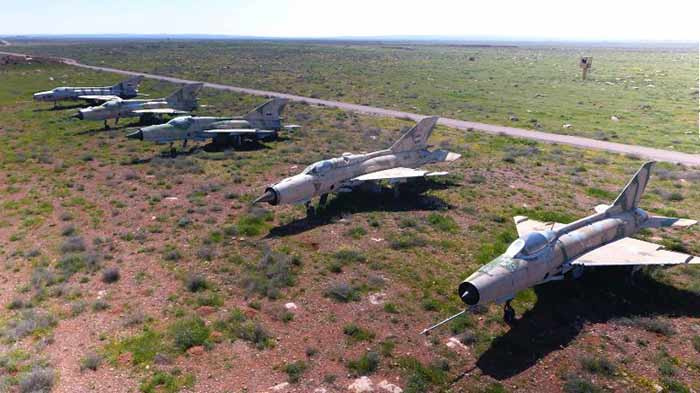US Strike on Syrian Airbase through Lens of Iranian Media

US strike on a military airfield in Syria, in response to the Syrian government’s alleged use of chemical weapons, has sparked analyses in Persian media outlets.
Iranian ultraconservative newspapers have condemned the attack on the grounds that it was siding with the terrorist Islamic State. Drawing on Iranian Foreign Minister Javad Zarif’s tweet and in an article headlined the “US-Daesh’s joint attack in Syria”, Javan daily recounts theories about the intention behind the missile attack. One hypothesis Javan highlighted is a theatrical maneuver to prove that Trump is not Russia’s man as he is ready to take action against Moscow’s interests if necessary. Another hypothesis considers the role of Saudi Arabia’s petrodollar allegedly offered to the US administration.
Hardliner Vatan Emrouz played a word game on film and novel title, One Flew over the Cuckoo’s Nest, trying to expose US President Donald Trump as a psychopath. Hardliner bellwether Kayhan daily also called the attack a clear sign that the US stands by the ISIS in Syria. “It seem that Trump intends to end the Syrian crisis by US decision and expel Bashar al-Assad from his country. However, he does not understand that he has arrived too late and there is almost no option left,” Kayhan daily wrote in an article.
Pro-reform newspapers remained less judgmental. In an op-ed for Shargh daily, Iran’s former ambassador to Jordan Mohammad Irani warned Trump of the abyss in Syria, while calling on the countries in the region to increase pressure on the US to avoid its involvement because the Syrian crisis should be resolved by Middle East countries themselves. Senior research fellow at Iran’s Institute for Middle East Strategic Studies Mohmmad-Ali Mohtadi tells Etemad daily in an interview that the scenario is a regional one, not limited to Syria, because the United States and its allies seek to tip down equilibriums, so far in the interest of the Resistance, in favor of themselves.
In a piece published on moderate website Fararu, Rahman Ghahremanpour wrote about three possible motivations behind the missile attack, which include sending signals to public opinions on Washington’s noncompliance vis-à-vis Moscow, to countries like Turkey and Saudi Arabia on the unpredictability of the Trump administration, and to the Middle East on US’ determination. The article concluded that the Trump administration did not necessarily mean to send a direct message to Iran, as its real policy in Syria is still vague.
Principlist website Alef, affiliated with former MP Ahmad Tavakoli, has also investigated the impact of the attack on the future of Syria. While it plays down the Trump administration’s role in Syria because of the paradoxes underlying its words and actions, Alef’s unsigned editorial argues that such naïve moves, designed to intimidate the Syrian government and its allies, could only come as a relief for the Axis of Resistance. “It is unlikely for the missile strike to be the intro to a predetermined, well-lit path. In many cases as in the liberation of Aleppo, the Syrian government and its allies have tolerated terrorist groups in order to neutralize West’s propaganda. These groups have now gathered in Idlib as the last foxhole. Any foreign or domestic invasion against Resistance forces undermines commitment to the ceasefire, political negotiations, and toleration with terrorist groups, providing legitimacy for the continuation of the war until the whole country is cleansed of terrorism,” Alef wrote.
Pro-reform website Asr Iran has published an article written by Maziar Aghazadeh who argues that the military strike could be new life to the exhausted Western-Arab coalition opposing the Syrian government and place the Trump administration as the leader of alliance. According to the article, the unprecedented move flaunts a difference with the Obama administration in public opinion when it comes to keeping promises. Aghazadeh goes on writing the attack also tells US friends and foes in the region that military attacks under the Trump administration will come without warnings. The article also argues that the attack could reinvigorate the Syrian opposition, after 2 years Russia and Iran had the initiative.
In an editorial published on the Persian section of Iranian Diplomacy, Ali Mousavi Khalkhali reviews US positions regarding Syria before and after the attack, arguing that it does not signify a shift in military status in the country as it was limited to a specified target. “It only sends certain messages to the Syrian government and its allies to beware that a new administration is in office in the United States, who will not easily make compromises and will respond decisively if its redlines are crossed,” writes Mousavi Khalkhali. He further quotes from former editor-in-chief of Al Quds Al Arabi Abdel Bari Atwan’s remarks in an interview with Deutsche Welle, saying it may be last week’s chemical attack could be a scenario masterminded by the Syrian opposition to influence US position regarding Syria and get it directly involved in the war. If the latter becomes reality, it would weaken Assad’s allies, Russia and Iran while boosting the interests of Israel, Saudi Arabia, and Turkey, Mousavi Khalkhali writes.

